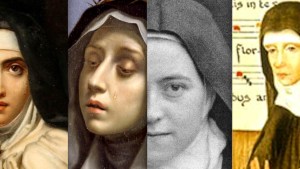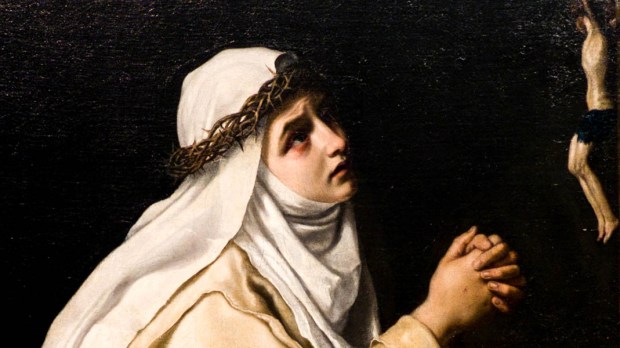On February 27, Le Prix de Lubac 2018 was unanimously awarded to Mother Marie des Anges Cayeaux, a religious sister and member of the Vatican Secretariat of State, for her doctoral thesis on The Central Role of God’s Desire in the Doctrine of Saint Catherine of Siena (1347-1380). The sister, from the Dominican Sisters of the Holy Ghost, explained to I.MEDIA the spiritual fruitfulness of this leading figure of the Church, one of four women declared a Doctor of the Church.
The prestigious Lubac Prize recognizes the best doctoral work in the French language from one of the Pontifical Universities in Rome. It is chaired by Cardinal Paul Poupard, president emeritus of the Pontifical Council for Culture.
Why did you choose St. Catherine of Siena as the subject of your doctorate?
At first, it was just a turn of events. I had to read St. Catherine of Siena for a piece of university work, with a little reticence I must confess … And I was struck by the place given to desire in her writings. It seemed to me to be at the heart of Catherinian theology. So I threw myself in, a little hesitant, surprised to notice that this had never been explored. Moreover, I was very quickly fascinated by the freedom of speech and tone of Saint Catherine. A tone that was both forceful and respectful, in which truth wasn’t an obstacle to charity, which effectively we find difficult to manage today.

Read more:
4 Inspiring women who are “Doctors of the Church”
And what did you find?
Catherine had a clear proposition: a path of perfection, through God’s desire present in man. And this desire is itself a response to God’s first desire for his creation. Entering this dynamic of desire is therefore, like Christ who became flesh, to want with a deep desire to fulfill the will of the Father, led by the Spirit. The whole of Catherine’s doctrine appears as a tireless exhortation to respond to God’s desire for man. My work also seeks to highlight the place given to intelligence in Catherine’s doctrine.
Her life is closely linked to that of the papacy. How relevant is this saint from the Middle Ages today?
The life of Saint Catherine is firstly dominated by the desire to honor God and the salvation of souls. It is for this reason that she is closely tied to the papacy. As the ruling pontiff is, according to her expression, “sweet Christ upon earth,” he is responsible for leading our souls to God. Catherine therefore expects from him the best of himself in his work. This is the basis of encouragements, and let’s say, her frankness, and always her unfailing support! This reveals an inner freedom and great enthusiasm – in the etymological meaning of the term: “inhabited by the divine.” The relevance of Catherine is in the dynamic of desire, seen as aremedy for indifference, and also in her appeal to profoundly redirect our desire toward the truth.
At the heart of her doctrine, we find the idea of the “inner cell” or “inner chamber.” How is this essential in our modern society?
For Catherine, knowledge of oneself and of God stems from the inner chamber, the protective shield of our inner life among all the worries and turbulence of the world. This allows us to constantly return to this conversation between the creature and the Creator. Catherine states on many occasions that self-knowledge, outside of God, leads man to despair; whereas, if he considers himself in the light of God’s word, the only thing he sees is that he is nothing and everything he is comes from God. This therefore places the creature in infinite gratitude, a source of holiness.
An edition of Désirer infiniment. La mystique de sainte Catherine de Sienne will be published at the end of this month with a preface by Cardinal Pietro Parolin, the pope’s Secretary of State.

